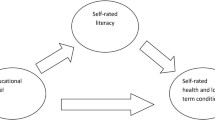Abstract
BACKGROUND: In several recent studies, the importance of education and race in explaining health-related disparities has diminished when literacy was considered. This relationship has not been tested in a nationally representative sample of U.S. adults.
OBJECTIVE: To understand the effect of adult literacy on the explanatory power of education and race in predicting health status among U.S. adults.
DESIGN: Using the 1992 National Adult Literacy Survey, logistic regression models predicting health status were estimated with and without literacy to test the effect of literacy inclusion on race and education.
SUBJECTS: A nationally representative sample of 23,889 noninstitutionalized U.S. adults.
MEASURES: Poor health status was measured by having a work-impairing condition or a long-term illness. Literacy was measured by an extensive functional skills test.
RESULTS: When literacy was not considered, African Americans were 1.54 (95% confidence interval, 1.29 to 1.84) times more likely to have a work-impairing condition than whites, and completion of an additional level of education made one 0.75 (0.69 to 0.82) times as likely to have a work-impairing condition. When literacy was considered, the effect estimates of both African-American race and education diminished 32% to the point that they were no longer significantly associated with having a work-impairing condition. Similar results were seen with long-term illness.
CONCLUSIONS: The inclusion of adult literacy reduces the explanatory power of crucial variables in health disparities research. Literacy inequity may be an important factor in health disparities, and a powerful avenue for alleviation efforts, which has been mistakenly attributed to other factors.
Similar content being viewed by others
References
Committee on Understanding and Eliminating Racial and Ethnic Disparities in Health Care. Introduction and literature review. In: Smedley BD, Stith AY, Nelson AR, eds. Unequal Treatment: Confronting Racial and Ethnic Disparities in Health Care. Washington, DC: The National Academies Press; 2003:29–79.
Lavizzo-Mourey R, Richardson WC, Ross RK, Rowe JW. A tale of two cities. Health Aff. 2005;24:313–5.
Baker DW, Parker RM, Williams MV, Clark WS, Nurss J. The relationship of patient reading ability to self-reported health and use of health services. Am J Public Health. 1997;87:1270–30.
Williams MV, Baker DW, Parker RM, Nurss J. Relationship of functional health literacy to patients’ knowledge of their chronic disease: a study of patients with hypertension and diabetes. Arch Intern Med. 1998;158:166–72.
Scott TL, Gazmararian JA, Williams MV, Baker DW. Health literacy and preventive health care use among Medicare enrollees in a managed care organization. Med Care. 2002;40:395–404.
Williams MV, Baker DW, Honig EG, Lee TM, Nowland A. Inadequate literate is a barrier to asthma knowledge and self-care. Chest. 1998;114:1008–15.
Bennett CL, Ferreira R, Davis TC, et al. Relation between literacy, race, and stage of presentation among low-income patients with prostate cancer. J Clin Oncol. 1998;16:3101–4.
Lindau ST, Tomori C, Lyons T, Langseth L, Bennet CL, Garcia P. The association of health literacy with cervical cancer prevention knowledge and health behaviors in a multiethnic cohort of women. Am J Obstet Gynecol. 2002;186:938–43.
Kirsch IS, Yamomoto Y, Norris N, et al. Technical Report and Data File User’s Manual for the 1992 Adult Literacy Survey. Washington, DC: National Center for Educational Statistics; 2000. Available at: http://nces.ed.gov/pubs2001/2001457.pdf. Accessed November 5, 2002.
Reder S. Dimensionality and construct validity of the NALS assessment. In: Smith CB, ed. Literacy for the 21st Century. Westport, CT: Praeger Publishers; 1998:37–57.
Kirsch IS, Jungeblut A, Jenkins L, Kolstad A. Adult Literacy in America: A First Look at the Findings of the National Adult Literacy Survey. Washington, DC: National Center for Education Statistics, US Department of Education; 1993.
Stata Corporation. Stata Statistical Software: Release 6.0. College Station, TX: Stata Corporation; 1999.
Agreshi A. Categorical Data Analysis. New York: John Wiley and Sons; 1990.
Ross CE, Wu C. The links between education and health. Am Sociol Rev. 1995;60:719–45.
Baker DW, Gazmararian JA, Sudano J, Patterson M. The association between age and health literacy among elderly persons. J Gerontol. 2000;55B:S368-S374.
Gazmararian JA, Baker DW, Williams MV, et al. Health literacy among Medicare enrollees in a managed care organization. JAMA. 1999;281:545–51.
Jackson RH, Davis TC, Bairnsfather LE, et al. Patient reading ability: an overlooked problem in health care. South Med J. 1991;84:1172–5.
Ad Hoc Committee on Health Literacy for the Council on Scientific Affairs. Health literacy: report of the council on scientific affairs. JAMA. 1999;281:552–7.
Finch BK, Hummer RA, Reindl M, Vega WA. Validity of self-rated health among Latino(a)s. Am J Epidemiol. 2002;155:755–9.
Franzini L, Ribble JC, Keddie AM. Understanding the Hispanic paradox. Ethn Dis. 2001;11:496–518.
Greenberg D. A critical look at health literacy. Adult Basic Educ. 2001;11:67–79.
Author information
Authors and Affiliations
Corresponding author
Additional information
Dr. Sentell was supported under an NIMH postdoctoral fellowship during the preparation of this manuscript. The results from this study were presented at the Academy Health conference in San Diego, California in June 2004.
Rights and permissions
About this article
Cite this article
Sentell, T.L., Halpin, H.A. Importance of adult literacy in understanding health disparities. J GEN INTERN MED 21, 862–866 (2006). https://doi.org/10.1111/j.1525-1497.2006.00538.x
Issue Date:
DOI: https://doi.org/10.1111/j.1525-1497.2006.00538.x




